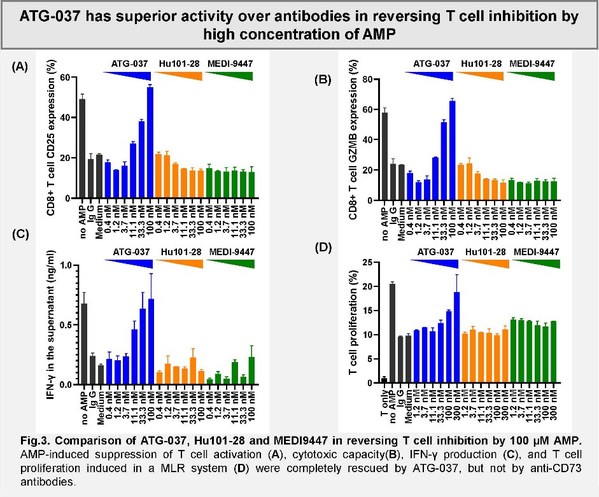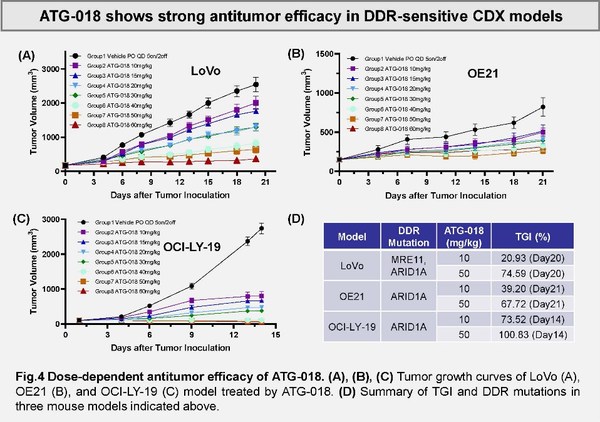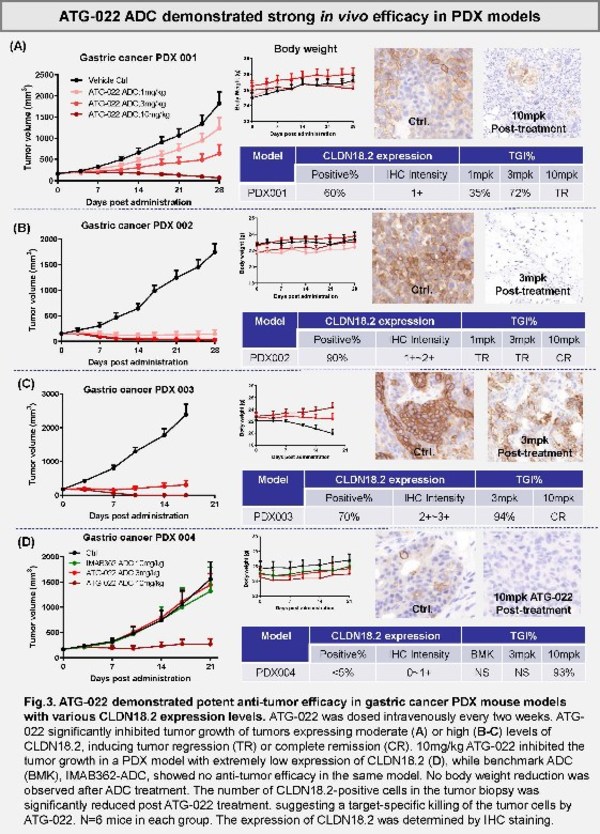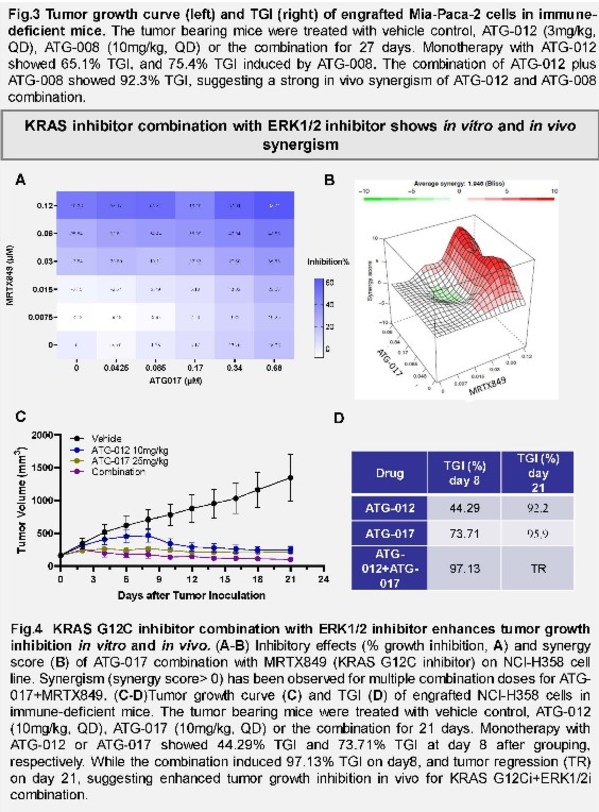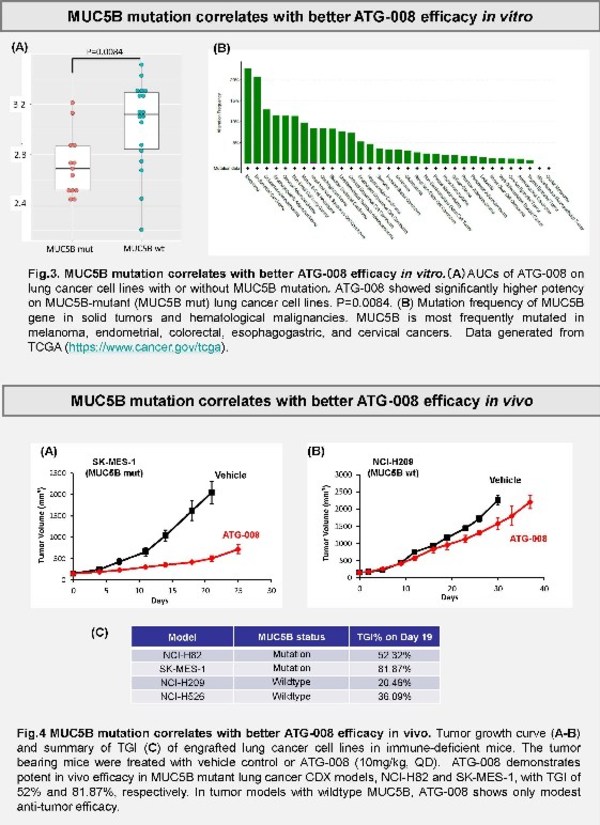Antengene Announces Publication of Five Posters at the 2022 American Association for Cancer Research (AACR) Annual Meeting
ByPublished : April 11, 2022 - 09:50
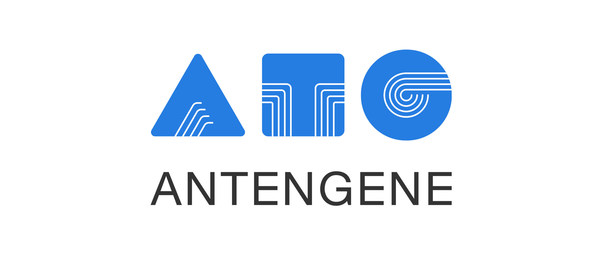
The company will present the preclinical data of five novel drug candidates at AACR 2022 (on April 8-13).
Focus on ATG-037, ATG-018, ATG-022, ATG-012 and ATG-008.
SHANGHAI and HONG KONG, April 11, 2022 /PRNewswire/ -- Antengene Corporation Limited ("Antengene" SEHK: 6996.HK), a leading innovative, global biopharmaceutical company dedicated to discovering, developing and commercializing first-in-class and/or best-in-class medicines for cancer, today announced the publication of five posters that will be presented during the upcoming 2022 American Association for Cancer Research Annual Meeting (AACR 2022), taking place from April 8th to April 13th in New Orleans in person or via virtual attendance.
(https://www.aacr.org/professionals/meetings/myaacr-support/ )
"The preclinical studies that we are presenting at AACR 2022 provide a window into five innovative programs in Antengene's pipeline," said Bo Shan, Ph.D., Chief Scientific Officer of Antengene. "These programs target areas that we believe are very important in cancer drug development: Tumor microenvironment (TME) regulators (ATG-037), pathway inhibitors (ATG-018, ATG-022 and ATG-008), and ADCs (ATG-022). These studies have been instrumental in guiding our clinical development plans for each program, including selection of combination partners and biomarkers, that could be used to predict efficacy or improve the proportion of patients who respond to treatment. We are very pleased to share these results with the oncology community."
Details of the posters and corresponding abstracts are shown below:
ATG-037, a highly potent small molecule CD73 inhibitor has superior activity of reversing immunosuppression in higher-AMP environments compared with anti-CD73 antibodies
Abstract: 2576
Session: Cell Cycle, Replication Inhibitors, and Immunotherapy Agents
Date and Time: 9:00 AM – 12:30 PM CST, April 12, 2022
Venue: Poster Section 21
This study was designed to compare the T-cell rescue activity of ATG-037, a highly potent and selective oral small molecule inhibitor of CD73, and two CD73 blocking antibodies. CD73 is an enzyme that is highly expressed in the tumor microenvironment and enables the degradation of AMP into adenosine, resulting in immunosuppression and cancer progression. In vitro assays were used to assess each compound's ability to inhibit CD73 enzyme activity and reverse AMP/adenosine mediated T-cell suppression. ATG-037 demonstrated more potent and complete inhibitory activity of cell surface CD73 in this study.
As shown in Figure, the authors found that ATG-037 had a stronger ability to restore T-cell function in higher-AMP environments compared with other clinical anti-CD73 antibodies. These data highlight the potential therapeutic advantages of small molecule inhibitors of CD73 over blocking antibodies. ATG-037 is being evaluated by Antengene in a Phase I trial as monotherapy and in combination with anti-PD-1 antibody in patients with locally advanced or metastatic solid tumors.
The novel ATR inhibitor ATG-018 is efficacious in preclinical cancer models
Abstract: 2604
Session: DNA Damage Response and Repair
Date and Time: 9:00 AM – 12:30 PM CST, April 12, 2022
Venue: Poster Section 22
In this study, the preclinical pharmacology data set supporting the development of ATG-018, a small molecule ATR inhibitor, was reviewed. Inhibiting ATR kinase (ataxia telangiectasia and Rad3 related kinase) leads to increased accumulation of double-strand breaks, particularly meaningful for tumor cells which rely on DNA damage response (DDR). ATG-018 was tested in a panel of 142 tumor cell lines and three CDX mouse models to assess anti-tumor efficacy and to identify potential predictive biomarkers. ATG-018 was a potent inhibitor of in vitro ATR activity inhibition and cell proliferation without significant impact on normal peripheral blood mononuclear cell (PBMCs) viability.
In addition, a series of genetic alterations were discovered that correlated with ATG-018 sensitivity and could be potential predictive biomarkers. As shown in Figure, the authors found that ATG-018 demonstrated potent in vivo efficacy in solid tumor/hematologic cancer models with certain DDR-related mutations. These data showed the potential of ATG-018 in synthetic lethality with homologous recombination deficiencies and promising application in a wide range of indications. With single-agent activity and no impact on PBMCs viability, ATG-018 may be well positioned for use in mono- or combination therapy in a wide range of tumors that rely on DDR. Development of a set of predictive biomarkers could enable its use as a precision-medicine. Antengene intends to file the first IND for ATG-018 in 2022.
ATG-022, an antibody-drug conjugate targeting Claudin 18.2, demonstrated potent in vivo efficacy in gastric cancer patient-derived xenografts
Abstract: 1143
Session: Preclinical and Clinical Pharmacology
Date and Time: 9:00 AM – 12:30 PM CST, April 11, 2022
Venue: Poster Section 25
In this preclinical study, ATG-022, an antibody-drug conjugate targeting Claudin18.2 (CLDN18.2), was evaluated in several gastric cancer patient-derived xenograft (PDX) models, to assess whether it had potential across a range of CLDN18.2 expression levels. Human CLDN18.2 is ectopically expressed in a large number of gastric and pancreatic cancers. Monoclonal antibody targeting CLDN18.2 demonstrated a promising clinical benefit when used in combination with chemotherapy. However, it showed suboptimal efficacy in patients with low CLDN18.2 levels.
In this study presented in the AACR, ATG-022 is reported to show high affinity (sub-nanomolar grade) against CLDN18.2 and demonstrated potent in vitro and in vivo antitumor effects, with in vivo efficacy observed in CLDN18.2 low expression PDX models. As shown in Figure, ATG-022 demonstrated much better in vivo efficacy compared with benchmark ADC. In addition, ATG-022 was highly specific for CLDN18.2, with virtually no effect on cells expressing CLDN18.1. In addition, ATG-022 has almost no impact on body weight, a proxy for safety. The authors concluded that ATG-022 shows promise for treating gastric cancer patients with a broad range of CLDN18.2 expression levels, a significant unmet need. Antengene is conducting preclinical studies for ATG-022.
Synergistic effects of the combination of Kras (G12C) with SHP2, ERK 1/2, mTORC1/2 or XPO1 inhibition for the treatment of Kras (G12C) mutated cancer
Abstract: 2679
Session: Signaling Pathway Inhibitors
Date and Time: 9:00 AM – 12:30 PM CST, April 12, 2022
Venue: Poster Section 25
This preclinical study was conducted to identify combination therapy regimen that could overcome the short progression free survival that is a characteristic of KRAS G12C inhibitors (linked to acquired resistance). The study evaluated the anti-tumor activity of ATG-012, a KRAS G12C inhibitor, with four other agents that are involved in the multiple pathways impacted by RASi: i) an SHP2 inhibitor (ET0038), ii) an ERK 1/2 kinase inhibitor (ATG-017), iii) an mTORC1/2 kinase inhibitor (ATG-008) or iv) the XPO-1 inhibitor, Selinexor, in preclinical solid tumor CDX models.
While ATG-012 monotherapy induced dose-dependent tumor growth inhibition at day 27, as shown in Figure, the authors also found strong in vivo synergism in 2-agent combinations. In particular, ATG-012 and clinical stage ERK inhibitor (ATG-017) demonstrate strong in vitro and in vivo synergism, suggesting potential clinical application which may overcome the rapid resistance of KRAS inhibitors. These data open the door to a range of combination partners for ATG-012 that could be fine-tuned to address drug resistance and potentially improve progression-free survival by matching tumor type/histology and combination partner for patients with the KRAS G12C mutation. Antengene is conducting preclinical studies for ATG-012.
Identification of MUC5B mutation as a positive predictive biomarker for mTORC1/2 inhibition by ATG-008 in lung cancer
Abstract: 4032
Session: Molecular Pharmacology
Date and Time: 9:00 AM – 12:30 PM CST, April 13, 2022
Venue: Poster Section 26
This study was designed to evaluate whether MUC5B could serve as a positive predictive biomarker for mTORC1/2 inhibition by ATG-008 (Onatasertib) in lung cancer. ATG-008 is a dual mTOR complex 1/2 kinase inhibitor. The mTOR complex regulates cell growth, metabolism, proliferation and survival. While the mTOR pathway is frequently deregulated in cancers, efficacy of mTOR inhibitors in lung cancer has been modest. In the study, 31 lung cancer cell lines were treated with ATG-008 to determine dose response and to correlate the gene mutation, amplification and expression with sensitivity to ATG-008.
As shown in Figure, the authors found that the presence of the MUC5B mutation correlates with more potent anti-tumor efficacy of ATG-008 in vitro and in vivo in lung cancer CDX models. The mucin MUC5B has a critical protective role in normal lung and has been identified as prognostic marker in multiple tumor types. One observation highlighted in the poster is that MUC5B is also mutated in melanoma, endometrial, colorectal, esophogastric and cervical cancers, vastly expanding the potential clinical utility of MUC5B mutation as the predictive biomarker for ATG-008. ATG-008 is being evaluated by Antengene in multiple Phase I and II clinical trials.
About Antengene
Antengene Corporation Limited ("Antengene", SEHK: 6996.HK) is a leading commercial-stage R&D-driven global biopharmaceutical company focused on innovative first-in-class/best-in-class therapeutic medicines for cancer and other life-threatening diseases. Driven by its vision of "Treating Patients Beyond Borders", Antengene aims to provide the most advanced anti-cancer drugs to patients in the Asia Pacific Region and around the world. Since initiating operations in 2017, Antengene has obtained 23 investigational new drug (IND) approvals in the US and in Asia, submitted 6 new drug applications (NDAs) in multiple Asia Pacific markets, with the NDA for selinexor/ATG-010/XPOVIO® in China, South Korea, Singapore and Australia approved. Leveraging partnerships as well as in-house drug discovery, Antengene has built a broad and expanding pipeline of 15 clinical and pre-clinical assets. Antengene has global rights on 10 programs and Asia Pacific rights, including the Greater China region, on 5 programs.
Forward-looking statements
The forward-looking statements made in this article relate only to the events or information as of the date on which the statements are made in this article. Except as required by law, we undertake no obligation to update or revise publicly any forward-looking statements, whether as a result of new information, future events or otherwise, after the date on which the statements are made or to reflect the occurrence of unanticipated events. You should read this article completely and with the understanding that our actual future results or performance may be materially different from what we expect. In this article, statements of, or references to, our intentions or those of any of our Directors or our Company are made as of the date of this article. Any of these intentions may alter in light of future development. For a further discussion of these and other factors that could cause future results to differ materially from any forward-looking statement, see the section titled "Risk Factors" in our periodic reports filed with the Hong Kong Stock Exchange and the other risks and uncertainties described in the Company's Annual Report for year-end December 31, 2020, and subsequent filings with the Hong Kong Stock Exchange.
For more information, please contact:
Investor Contacts:
Donald Lung
E-mail: Donald.Lung@antengene.com
Mobile: +86 18420672158
PR Contacts:
Peter Qian
E-mail: Peter.Qian@antengene.com
Mobile: +86 13062747000









![[Today’s K-pop] Blackpink’s Jennie, Lisa invited to Coachella as solo acts](http://res.heraldm.com/phpwas/restmb_idxmake.php?idx=644&simg=/content/image/2024/11/21/20241121050099_0.jpg&u=20241121172748)


